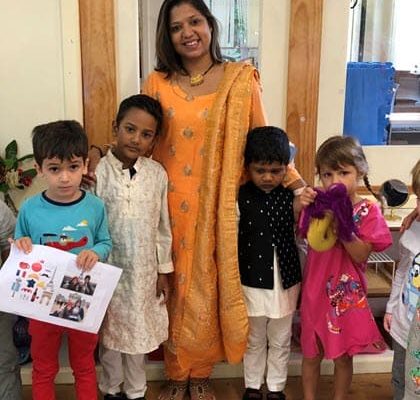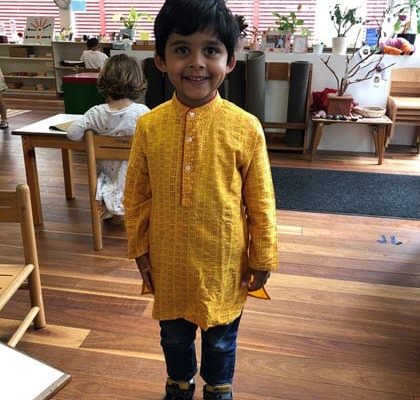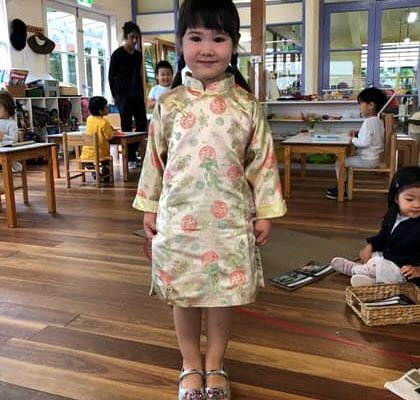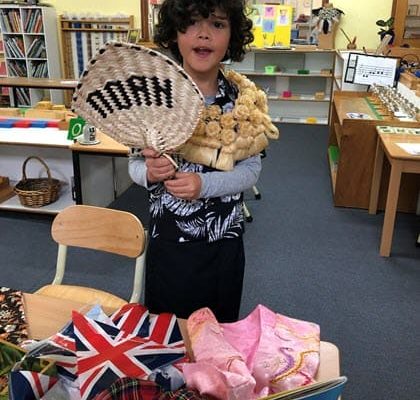Our world is often a tumultuous and scary place. How can we help our children feel safe and cared for, while preparing them to lead the way as adults? How can we cultivate empathy, kindness, gratitude, and the sense of community that helps people work together?
Montessori education has been addressing these issues for over a hundred years. Sometimes the lessons are direct; at other times they are more subtle. The mission is always clear: we want children to have a wide view of the world. We want them to appreciate the diversity of others. We want them to have the tools to navigate this world peacefully.
How do we approach this critical task?
Montessori schools teach peace both directly and indirectly. Sure, we talk about peace and its importance openly and frequently. We talk about what it means and what it looks like and what children can do to become peacekeepers. But, perhaps more importantly, we model. Through our words, the tone of our voices, and with our actions, we show children what it means to be peaceful. They watch our everyday actions and learn so much from them, so why not create constant learning opportunities?
Teaching a global perspective
Even from a very young age, Montessori children are taught geography through the lense of the whole world. They learn about the continents when they are as young as three years old. These studies often include learning about biomes, instead of an emphasis on political boundaries. Teaching about the world in this way gives children a sense of the natural world and people as a whole as primary to different countries.
Primary aged Montessori children enjoy many lessons with timelines. They learn about the origins of humanity, and studying ancient cultures is fascinating for them.
Embracing a variety of cultures
One important series of lessons in the primary years teaches the fundamental needs of humans. Children explore how groups of people around the world and across the ages meet and have met their needs. Physical needs, such as food, shelter, defense, and transportation are considered, as well as spiritual needs like art and religion.
Each year at Forestville Montessori School we celebrate Harmony Week. This year’s theme was ‘Everyone Belongs’. It’s one of the many ways we celebrate cultural identity, diversity and inclusiveness. It’s all about respect.
Giving them tools
Montessori teachers are equipped to give children skills to resolve conflicts. We give children tools such as micro-mediation and give them the words and actions to express their needs and feelings while listening to those of others.
In Montessori classrooms, children often learn a variety of self-calming strategies. This might include mindfulness meditation, yoga, breathing exercises, or the use of small hand-held tools such as a finger labyrinth or polished stone.
Taking the time
In Montessori classrooms the day is not structured with rigid timed intervals. This flexible schedule lends itself to shifting course and having discussions in the moment.
For example, if a group of children are experiencing difficulty resolving a problem together, the teacher is able to stop and sit with them. Without feeling rushed, they can take the time to figure out what went wrong and how to make it right. Instead of an adult doling out consequences, we have the time to sit and work through conflict authentically.
Giving to the community
As Montessori children get older, they are encouraged to give back to their community. These acts of charity will often be inspired by the children’s ideas. Children may collect food and supplies for a local animal shelter, or make and sell baked goods to benefit a cause they believe in. Before COVID, we were all set to visit residents in a local nursing home. We’re hoping to start this program soon.
By supporting children with logistics, we can encourage them to learn how to be active and supportive members of their communities at a young age. They learn the importance of volunteering and contribution to others.
Giving back is just one way a child begins their active role as a peaceful member of society.








